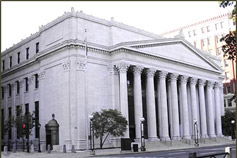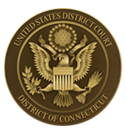United States Magistrate Judge for the District of Connecticut
Staff Information
| Alyssa Esposito | Career Law Clerk | 203-773-2022 |
| Rachel Sandor | Law Clerk | 203-773-2022 |
| Sarah Santos | Courtroom Deputy | 203-773-2414 |

RICHARD C. LEE UNITED STATES COURTHOUSE
141 Church Street
New Haven, Connecticut 06510
Location: Courtroom 4
| Chambers Telephone | 203-773-2022 | |
| Clerk's Office Telephone | 203-773-2140 | |
| Clerk's Office Fax | 203-773-2334 |
Consent and Reference of a Civil Action to a Magistrate Judge
What is a Magistrate Judge?
